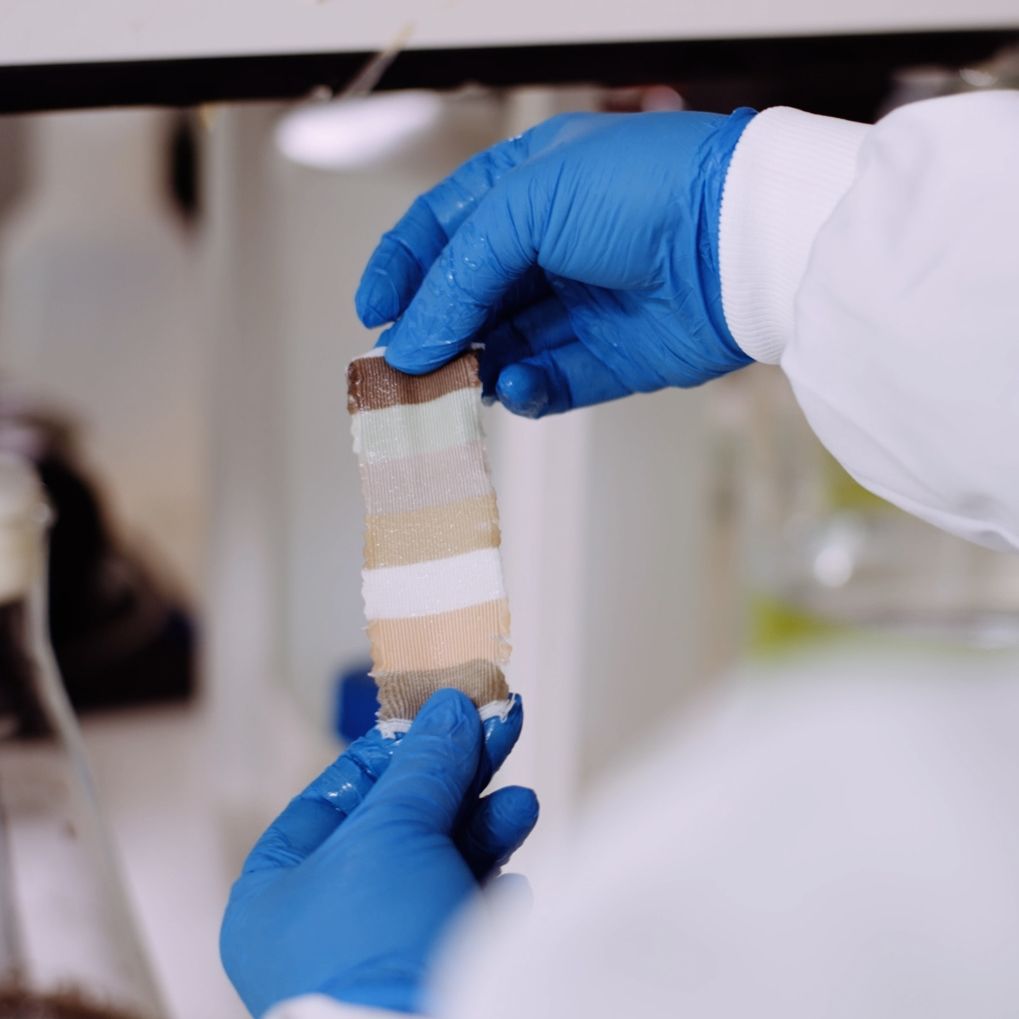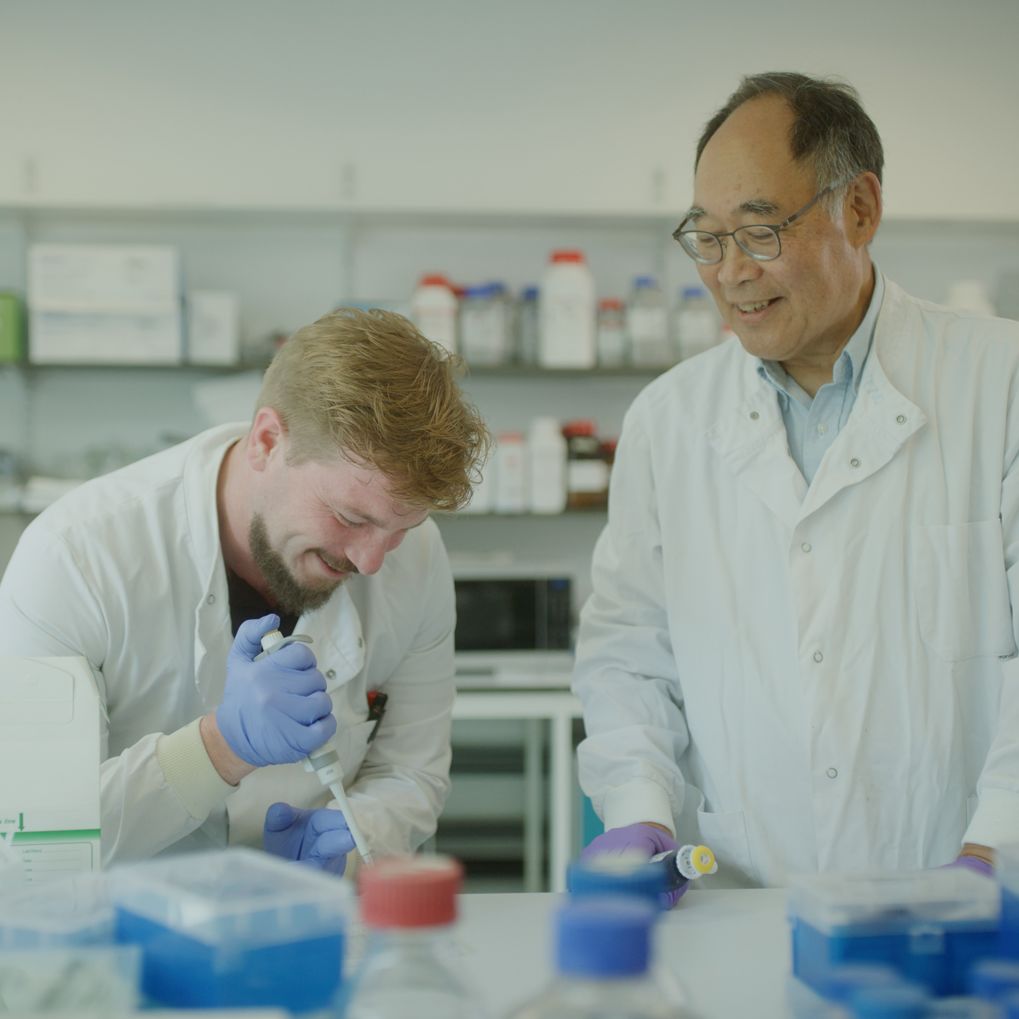Case study: Environmental Solutions, Clean Growth
Colorifix
Part of the Engineering Biology Story

The textile industry uses production processes and materials that are intensely damaging to the environment. The EU estimates that the sector was the 3rd largest source of water degradation and land use in 2020 and is responsible for 20% of global clean water pollution and 10% of global carbon emissions.
Colorifix was founded in 2016 by Dr Jim Ajioka (Chief Scientific Officer) and Dr Orr Yarkoni (Chief Executive Officer). Colorifix is a spin-out from the Ajioka lab at the University of Cambridge, with inspiration from research projects including UKRI OpenPlant and UKRI Global Challenges Research Fund Analysis of arsenic contamination in Goalmari (Bangladesh).
OpenPlant is a joint initiative between the University of Cambridge, the John Innes Centre and the Earlham Institute, funded by UKRI as part of the UK Synthetic Biology for Growth Programme. Both synthetic biology researchers worked together in the Ajioka Lab at Cambridge.
Colorifix targets the issue of pollution from the textile dying industry by genetically engineering bacteria to produce pigments. The company grows the bacteria on a commercial scale using sustainable feedstocks, allowing colours to be produced without damaging chemicals, less water and less C02 emissions. The bacteria can also be used to deposit pigments onto textiles. Part of the synthetic biology approach that Colorifix uses to deposit and fix pigments onto textiles was developed through OpenPlant.
Colorifix, which now employs 101 people, has collaborated with:
- H&M on a colour story collection
- Pangaia on a range of hoodies, using pigments found in silk cocoons and the Midway Geyser in Yellowstone National Park
- Vollebak on their DNA T-shirt, using DNA from the indigo plant
- Grupo Impetus Group and OceanSafe, launching fabric made from OceanSafe’s biodegradable polyester and dyed using Colorifix’s process.
Colorifix is currently expanding globally to scale its technology and change the industry for the better. BBSRC has granted a 2024 Engineering Biology Mission Award for Imperial College London to collaborate with SMEs, including Colorifix, innovating textile production through engineering biology.
Colorifix: How it works. (1min 44secs) (Credit: Colorifix)
Colorifix is changing the fashion industry by using engineered organisms to produce pigments and dye fabrics. (Credit: Colorifix)
Colorifix is changing the fashion industry by using engineered organisms to produce pigments and dye fabrics. (Credit: Colorifix)
Colorifix is founded by Dr Jim Ajioka and Dr Orr Yarkoni. (Credit: Colorifix)
Colorifix is founded by Dr Jim Ajioka and Dr Orr Yarkoni. (Credit: Colorifix)
Colorifix is changing the fashion industry by using engineered organisms to produce pigments and dye fabrics. (Credit: Colorifix)
Colorifix is changing the fashion industry by using engineered organisms to produce pigments and dye fabrics. (Credit: Colorifix)
Colorifix is founded by Dr Jim Ajioka and Dr Orr Yarkoni. (Credit: Colorifix)
Colorifix is founded by Dr Jim Ajioka and Dr Orr Yarkoni. (Credit: Colorifix)
The textile industry uses production processes and materials that are intensely damaging to the environment. The EU estimates that the sector was the 3rd largest source of water degradation and land use in 2020 and is responsible for 20% of global clean water pollution and 10% of global carbon emissions.
Colorifix was founded in 2016 by Dr Jim Ajioka (Chief Scientific Officer) and Dr Orr Yarkoni (Chief Executive Officer). Colorifix is a spin-out from the Ajioka lab at the University of Cambridge, with inspiration from research projects including UKRI OpenPlant and UKRI Global Challenges Research Fund Analysis of arsenic contamination in Goalmari (Bangladesh).
OpenPlant is a joint initiative between the University of Cambridge, the John Innes Centre and the Earlham Institute, funded by UKRI as part of the UK Synthetic Biology for Growth Programme. Both synthetic biology researchers worked together in the Ajioka Lab at Cambridge.
Colorifix targets the issue of pollution from the textile dying industry by genetically engineering bacteria to produce pigments. The company grows the bacteria on a commercial scale using sustainable feedstocks, allowing colours to be produced without damaging chemicals, less water and less C02 emissions. The bacteria can also be used to deposit pigments onto textiles. Part of the synthetic biology approach that Colorifix uses to deposit and fix pigments onto textiles was developed through OpenPlant.
Colorifix, which now employs 101 people, has collaborated with:
- H&M on a colour story collection
- Pangaia on a range of hoodies, using pigments found in silk cocoons and the Midway Geyser in Yellowstone National Park
- Vollebak on their DNA T-shirt, using DNA from the indigo plant
- Grupo Impetus Group and OceanSafe, launching fabric made from OceanSafe’s biodegradable polyester and dyed using Colorifix’s process.
Colorifix is currently expanding globally to scale its technology and change the industry for the better. BBSRC has granted a 2024 Engineering Biology Mission Award for Imperial College London to collaborate with SMEs, including Colorifix, innovating textile production through engineering biology.
Colorifix: How it works. (1min 44secs) (Credit: Colorifix)
BBSRC invests to push back the frontiers of biology and deliver a healthy, prosperous and sustainable future.
www.ukri.org/councils/bbsrc/
Get in touch with us to discuss BBSRC’s research outcomes and impacts or to tell us about your own:
Emma Lambourne
Senior Manager, Impact Evidence
emma.lambourne@bbsrc.ukri.org
Dr Beverley Thomas
Associate Director, Evidence and Evaluation
beverley.thomas@bbsrc.ukri.org
Dr Rosie Ford
Manager, Impact Evidence
rosie.ford@bbsrc.ukri.org
For more information about Engineering Biology contact BBSRC’s Transformative Technologies Team
Eng.Bio@bbsrc.ukri.org





